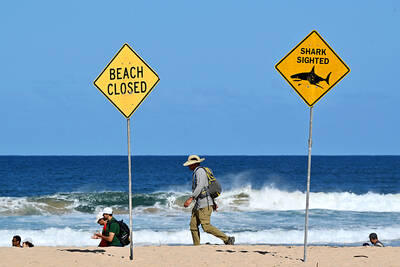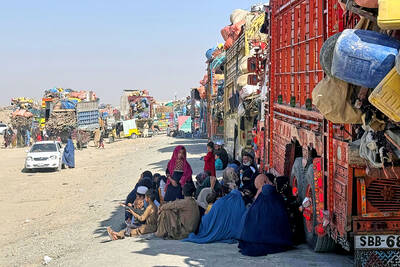The copyright of Adolf Hitler’s Mein Kampf expired yesterday, with plans by several publishers for annotated reprints sparking fierce debate over how one of the world’s most controversial books should be treated seven decades after the defeat of the Nazis.
The southern German state of Bavaria was handed the copyright of the book in 1945, when the Allies gave it the control of the main Nazi publishing house.
For 70 years, it refused to allow the anti-Semitic manifesto to be republished out of respect for victims of the Nazis and to prevent incitement of hatred, but Mein Kampf — which means “My Struggle” — fell into the public domain yesterday, meaning that the state of Bavaria can no longer challenge reproductions or translations of the inflammatory work.
For several European nations that were under Nazi occupation, including Austria and the Netherlands, the expiration of copyright would have little impact as reprints and sales of Hitler’s diatribe remain banned.
However, in Germany historians have readied an annotated version to hit the bookstores on Friday, while in neighboring France publisher Fayard is to go ahead with a new French version, sparking chagrin in some quarters.
Some academics argue in favor of the reprints, saying they would serve to demystify the notorious 800-page document, particularly given that the tract is freely available in many parts of the world and on the Internet.
In India and Brazil, the book is easily found, while in Japan even a manga version of the tract is available. In Turkey, more than 30,000 copies have been sold since 2004 and the book is not prohibited in the US.
Nevertheless, opinion is split, particularly among Jewish groups, some of which want a ban maintained, while others see reason in an academic version being made available for educational purposes.
No nation is as torn over the book as Germany, where all reprints have been halted since 1945.
Partly autobiographical, Mein Kampf outlines Hitler’s ideology that formed the basis for Nazism. He wrote it in 1924 while he was imprisoned in Bavaria for treason after his failed beer-hall putsch.
The book set out two ideas that he put into practice as Germany’s leader going into World War II — annexing neighboring countries to gain lebensraum, or “living space,” for Germans, and his hatred of Jews, which led to the Holocaust. About 12.4 million copies were published in Germany until 1945 and copies can be found in academic libraries.
Germany’s Jewish community leader Josef Schuster said “the despicable propaganda pamphlet Mein Kampf should remain banned,” although he did not oppose an academic version with explanations for educational and research purposes.
Such an annotated version is what historians at the Institute of Contemporary History of Munich (IFZ) have prepared.
The IFZ version, running to 2,000 pages in two volumes including the added commentary, has been in the works since 2009 and aims to “deconstruct and put into context Hitler’s writing.”
The book, to retail at 59 euros (US$65) from Friday, looks at key historical questions, the institute said, including: “How were his theses conceived? What objectives did he have?”
German Minister for Education Johanna Wanka has argued that such an academic version should be introduced to all classrooms across Germany, saying it would serve to ensure that “Hitler’s comments do not remain unchallenged.”
“Pupils will have questions and it is only right that these can be addressed in classes,” she said.
However, Charlotte Knobloch, who is president of the Jewish community in Munich and Upper Bavaria, warned that even this version carries certain risks as it “contains the original text” and that it was also “in the interest of right-wing militants and Islamists to spread these ideas.”
To these fears, IFZ director Andreas Wirshing argued that each passage of the original text is accompanied by a commentary, forcing readers “to notice the commentaries and take them into account.”
“Any Hitler sympathizers who might be interested in the book are better off looking elsewhere,” he told Deutsche Welle.
In neighboring France, Council of Jewish Institutions president Roger Cukierman called the planned French reprints “a disaster.”
“Such horror can already be found on the Internet. What would happen if Mein Kampf also becomes bedside reading?” he asked.
In Israel, where reprints have been banned, the expiration of the copyright would not lift a deep-seated taboo.
Murray Greenfield, founder of Gefen Publishing, which focuses on books about Judaism and its history, said he would not publish it “even if they paid me.”

With much pomp and circumstance, Cairo is today to inaugurate the long-awaited Grand Egyptian Museum (GEM), widely presented as the crowning jewel on authorities’ efforts to overhaul the country’s vital tourism industry. With a panoramic view of the Giza pyramids plateau, the museum houses thousands of artifacts spanning more than 5,000 years of Egyptian antiquity at a whopping cost of more than US$1 billion. More than two decades in the making, the ultra-modern museum anticipates 5 million visitors annually, with never-before-seen relics on display. In the run-up to the grand opening, Egyptian media and official statements have hailed the “historic moment,” describing the

SECRETIVE SECT: Tetsuya Yamagami was said to have held a grudge against the Unification Church for bankrupting his family after his mother donated about ¥100m The gunman accused of killing former Japanese prime minister Shinzo Abe yesterday pleaded guilty, three years after the assassination in broad daylight shocked the world. The slaying forced a reckoning in a nation with little experience of gun violence, and ignited scrutiny of alleged ties between prominent conservative lawmakers and a secretive sect, the Unification Church. “Everything is true,” Tetsuya Yamagami said at a court in the western city of Nara, admitting to murdering the nation’s longest-serving leader in July 2022. The 45-year-old was led into the room by four security officials. When the judge asked him to state his name, Yamagami, who

DEADLY PREDATORS: In New South Wales, smart drumlines — anchored buoys with baited hooks — send an alert when a shark bites, allowing the sharks to be tagged High above Sydney’s beaches, drones seek one of the world’s deadliest predators, scanning for the flick of a tail, the swish of a fin or a shadow slipping through the swell. Australia’s oceans are teeming with sharks, with great whites topping the list of species that might fatally chomp a human. Undeterred, Australians flock to the sea in huge numbers — with a survey last year showing that nearly two-thirds of the population made a total of 650 million coastal visits in a single year. Many beach lovers accept the risks. When a shark killed surfer Mercury Psillakis off a northern Sydney beach last

‘NO WORKABLE SOLUTION’: An official said Pakistan engaged in the spirit of peace, but Kabul continued its ‘unabated support to terrorists opposed to Pakistan’ Pakistan yesterday said that negotiations for a lasting truce with Afghanistan had “failed to bring about a workable solution,” warning that it would take steps to protect its people. Pakistan and Afghanistan have been holding negotiations in Istanbul, Turkey, aimed at securing peace after the South Asian neighbors’ deadliest border clashes in years. The violence, which killed more than 70 people and wounded hundreds, erupted following explosions in Kabul on Oct. 9 that the Taliban authorities blamed on Pakistan. “Regrettably, the Afghan side gave no assurances, kept deviating from the core issue and resorted to blame game, deflection and ruses,” Pakistani Minister of